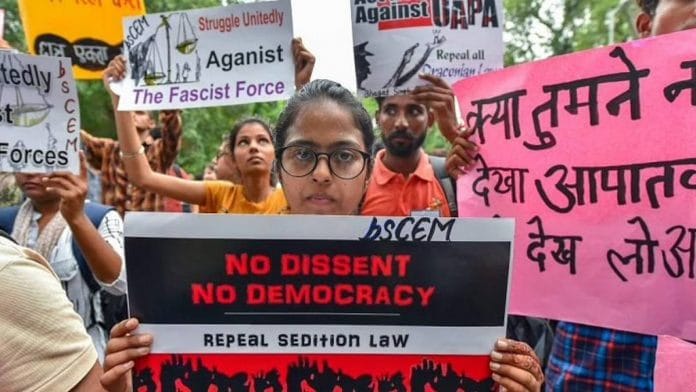The past few years have been a testing time for democracies around the world. Debates with regard to free speech, blasphemy, sedition, hate speech, and bans have become a regular phenomenon not only outside of India but also within. Since 2016 especially the term ‘sedition’ has again reappeared into vogue with TV anchors screaming on this issue, ‘WhatsApp University’, social media, newspapers, and of course our drawing room conversations having centred on what kind of speech in the public is ‘anti-national’. As an amateur, with the little understanding of politics and political science that I had, while it was all becoming viral in 2016, this very term ‘sedition’ itself sounded quite provocative at the outset. This article may not be able to reflect the entire discourse on sedition, but I have tried to put forth my take on this matter.
The law of sedition to me is an appropriate representation of a relationship between intolerant-despotic state power and its subject. This colonial era penal provision sought to imprison people for ‘disaffection’ towards the government established by law in British India. Interestingly the first case of sedition that is Section 124A was in the year 1891 against Bangabasi, a Calcutta weekly. The second case was against Bal Gangadhar Tilak for his poem, ‘Shivaji’s Utterances’ in his weekly publication Kesari.
The British government found Tilak guilty of attempting to excite feelings of disaffection and disloyalty by vocalising Shivaji as a warrior who rebelled and fought against a foreign power. One may find it even justifiable for a colonising government like the Britishers who intended to rule India as a colony and not govern it as a welfare state. This is the main difference between British rule and independent India. The sovereignty of the Indian state lies in the sovereignty of its people, meant to reflect the will of the people. But what has actually transpired is that the 19th-century draconian penal provision still exists in our law books and is also imposed by the state whenever the state feels ‘uncomfortable’ about certain statements. It has become a weapon for the state to stifle dissent in society be it against students, journalists, poets, and anyone according to the whip and fancies of the state. A single use of this law against even one citizen can have a widespread effect on society, indicating that next time no one even dares to stand up against the state’s power.
Also read: India has debated sedition at length but it won’t go without the overhaul of justice system
The government is bent on policing rather than behaving like a welfare-democratic state. These laws aren’t a new addition post-BJP’s grand win in 2014, but it interesting is that they are being revoked in a manner like never before. Data also suggests the number of sedition cases registered in 2014 was 47, 30 in 2015, 35 in 2016, 51 in 2017, 70 in 2018, and 93 in 2019. The majority of those detained under sedition in 2019 were between the ages of 18 and 30. According to the NCRB report, the number of sedition cases increased by 160 per cent between 2016 and 2019, while the rate of conviction fell to 3.3 per cent in 2019 from 33 per cent in 2016. Twenty-one cases were closed due to ‘insufficient’ evidence, two were classified as ‘false’, and six cases were determined to be civil disputes based on the final police reports.
This law is the reflection of how even in a democratic nation-state the state suspects and considers its citizens as its biggest threat, therefore rather than repealing such provisions, it continues to use it. This scanner of suspects between the two very important pillars of a modern nation-state somehow also dampens the ‘social contract’ between its people and the state. One of the key ideas of a social contract is the idea of a trust relationship that the two must share. However, when a government starts behaving like a surveillance state and uses its mechanisms like police and army, it betrays the making of an intolerant state.
Now, one may argue that such laws act as a deterrent to ensure public order and safeguard national security. I find this notion of muzzling dissent in the name of national security highly flawed. It means that a state’s power, its institution, and the mechanism are so weak that it cannot address or swallow such ‘distasteful’ speech and arbitrarily uses such draconian penal codes. Sedition has become armor for the current dispensation, which to fulfill its majoritarian goals, uses it to target a certain minority community. The kind of effect it has against whom it is used also reflects the kind of prejudice and tension that it can bring in the body politic of the society when used against Muslims in India. This effect now does not remain local but with one click, it can become viral. The larger population without even hunting for the truth becomes prey to such propaganda by the state.
I have left the article open-ended because this is an ongoing issue. One never knows, even I might even fall prey to the law for voicing my thoughts.
The author is a student at Zakir Husain Delhi College, University of Delhi. Views aare personal






